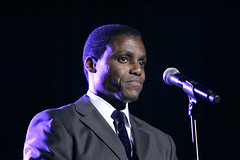 Image by United Nations Photo via Flickr
Image by United Nations Photo via Flickr
By JEAN ORTIZ
Associated Press Writer
OMAHA, Neb.
The story of the 18-year-old Ukrainian mother sold to work in a brothel in Turkey after she answered an ad to work abroad was just the start of it for Ron Hampton.
Hampton, a University of Nebraska-Lincoln marketing professor, has heard countless stories of callous exploitation in his research of human trafficking. But his concern is that many others haven't.
He believes he and other researchers are able to help raise awareness and fight the fast-growing global criminal industry that's operating even in Nebraska. But first, he says, they must understand it.
Researchers from across the country, along with government representatives and others working to end human trafficking, are set to gather this week in Lincoln. UNL will host a three-day conference, titled "What We Know and What We Need to Know," beginning Thursday.
Keynote speaker Kevin Bales, president of Free the Slaves, a Washington, D.C.-based organization focused on ending slavery worldwide, will offer a free lecture Thursday night.
The conference came together through the efforts of UNL's anti-trafficking team, a group that includes Hampton and faculty members from diverse backgrounds. They've been meeting for more than a year to share research and their ideas to curb the problem.
Organizers say the conference is part of a bigger plan to make UNL a hub for human trafficking research.
"It might as well start here as anywhere else. The problem is worldwide," said marketing professor Dwayne Ball.
Worldwide, an estimated 27 million people may be enslaved, according to the United Nations and other experts. The U.S. State Department estimates that includes as many as 200,000 in the United States.
"There are people in forced labor everywhere and in this country. It's very invisible," said Leslie Wolfe, president of the Center for Women Policy Studies. Wolfe is among the conference's scheduled speakers.
The crime in the United States isn't limited to border states or big cities, she said. Any place with a highway or an airport is vulnerable.
Nebraska isn't immune, Hampton and Ball say.
Take the recent case of the 12-year-old Central American girl sold to a Mexican slave trader after her family left her in her uncle's care, Hampton said. She landed in central Nebraska unable to speak English or trust anyone after she'd been raped and beaten in spirit along the way, he said.
In 2008, an Iowa court prosecuted its first human trafficking case - that of a man who recruited and harbored two Nebraska girls for commercial sexual activity, including prostitution and performing at strip clubs. Prosecutors said the girls, ages 15 and 16, were runaways.
Illicit sex trafficking accounts for part of the problem, but the majority of cases are believed to be men forced into labor - many in factories, the construction industry and in agricultural settings, Hampton said. Many are working off debt to masters who provided them entry into the United States.
U.N. officials and other experts have estimated human trafficking is a $32 billion industry.
Ultimately, it's a marketing-system problem, Hampton said.
"We're talking about buying and selling labor - human beings," said Hampton, who was drawn to the issue four years ago at the encouragement of a student familiar with problems in Ukraine.
In the case of the Ukrainian mother working a sex slave in Istanbul, Hampton said she would see as many as 20 clients and earned her master about $2,000 a night, but had nothing to show for it.
"People have got to see the impact it has on human life," he said.
That's Wolfe's focus, too.
"For me the important thing is to understand it in the context of human rights, which is a very big issue in the rest of the world and hopefully soon will be in the U.S.," she said.
http://seattletimes.nwsource.com/html/businesstechnology/2010139153_apushumantraffickingnebraska.html
![Reblog this post [with Zemanta]](http://img.zemanta.com/reblog_e.png?x-id=53a92bed-251b-41c4-86cd-97f047f99c54)

No comments:
Post a Comment